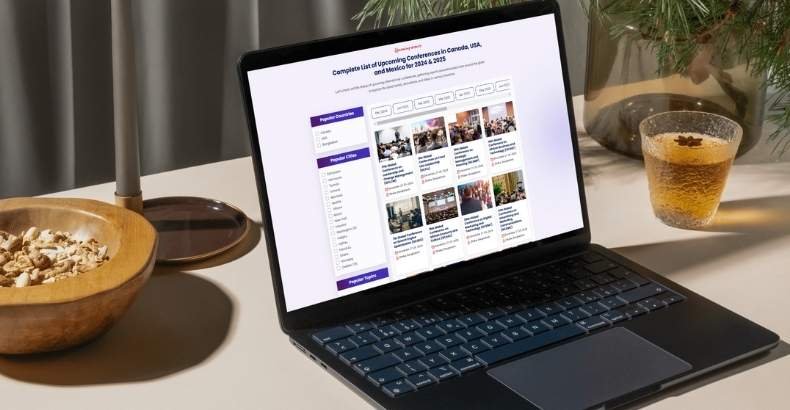Nurse conferences contribute greatly to advancing the nursing profession in the fast-paced healthcare industry. These events connect nurses from various backgrounds and specialties, creating opportunities for sharing knowledge and experiences. As you explore the field of nursing conferences, you may find yourself wondering: Who should participate in a nursing conference?
Nursing conferences are ideal for everyone, from students to seasoned professionals. Nursing students can make connections between theory and practice; new graduates transition smoothly into professional life, and experienced nurses learn about emerging trends. Leaders, educators, and researchers also benefit, finding insights, collaboration, and professional support relevant to their respective roles.
Curious about how these conferences can impact your nursing career? Take a look into this article for everything you need to know about who benefits most from attending and how these events can support your career in nursing.
Nursing Conference: Why Should You Attend One?
For many professionals, attending a nursing conference can be a fulfilling experience. It allows you to learn about new trends and gain updated knowledge in the field. You can meet experts who share their insights, which can help you in your day-to-day work. This can also boost your confidence.

Conferences bring people together who share a common interest in nursing. You will meet like-minded people from different backgrounds and areas of expertise. These events allow you to expand your network, and you may even find career opportunities. Connecting with others can lead to meaningful growth and development.
You can also gain practical skills and knowledge to use in your job. Many conferences offer hands-on workshops and sessions that focus on patient care, technology, and health policy. These interactive sessions make learning more engaging and impactful, helping you stay current with best practices in nursing.
One of the best parts of attending a nursing event is the chance to travel and explore new places. For instance, if you are planning to attend the upcoming international nursing conference in Canada, you’ll enjoy professional growth while exploring a beautiful country. This combination of learning and adventure makes it an ideal experience for many nurses.
Who Should Participate in a Nursing Conference?
Conferences for nurses provide priceless chances for education, networking, and career development. They are ideal for a range of participants, from students to seasoned professionals, looking to improve their knowledge and skills. Let’s explore who benefits the most:

Nursing Students
By networking with seasoned professionals, nursing students greatly benefit from attending conferences. Introduction to real-world topics helps establish a connection between theory and practice. Conferences also allow students to explore potential career paths, building confidence as they prepare to enter the workforce.
New Graduate Nurses
For recent nursing graduates, conferences provide a smooth transition from education to professional life. These events showcase the latest practices and tools that can help new nurses feel prepared. Gaining insights directly from industry leaders also promotes a deeper knowledge of patient care expectations.
Experienced Registered Nurses
During conferences, seasoned registered nurses can learn about new trends and expand their horizons. Interacting with peers and specialists allows them to refresh and refine their skills. Continuous learning keeps seasoned nurses motivated and engaged in their practice.
Advanced Practice Registered Nurses
These conferences are crucial for maintaining expertise for advanced practice nurses, including clinical nurse specialists and nurse practitioners. Specialized sessions offer insights into advanced treatments and research. Engaging with other experts at this level strengthens their role and supports their high-level responsibilities in patient care.
Nurse Educators
Educators play an important role in developing nurses, making conference attendance crucial for staying informed. Learning about updated teaching methods, innovative technologies, and changing curriculum guidelines enhances their ability to educate effectively. Networking with other educators also encourages collaborations that benefit their students.
Nursing Leaders and Administrators
Those in leadership or administrative roles gain valuable insights into management practices and healthcare policies at conferences. Exposure to new strategies for workforce management and policy changes helps them improve operations. Engaging with other leaders allows them to discuss common challenges and share effective solutions.
Healthcare Researchers
Attending conferences allows nursing researchers to share their findings and get input from colleagues in the field. These events allow researchers to explore funding opportunities, collaborate with like-minded professionals, and stay informed about the latest studies. Interaction with practitioners also aids in learning real-world applications of their work.
Policy Advocates in Nursing
For policy advocates, conferences are crucial to the advancement of initiatives that affect the nursing profession. Learning about current healthcare issues and policy changes equips them to make informed recommendations. Meeting with others passionate about advocacy strengthens their commitment and inspires future efforts.
Many different types of professionals attend nursing conferences, and each one gains something different from the event. These events improve knowledge, collaboration, and innovation, supporting the growth and evolution of the nursing field as a whole.
How Do You Attend a Nursing Conference?
Going to a nursing conference offers networking opportunities, educational opportunities, and priceless insights. Preparing for it ensures that you get the most from each session and activity. Let’s go through the key steps to make your attendance seamless.
Plan Your Conference Goals
Setting clear goals helps you focus on specific areas of interest and maximize the conference experience. You might want to learn about new practices, connect with professionals, or explore career paths. With these goals in mind, selecting relevant sessions and activities becomes easier and more meaningful.
Budget and Financial Planning
Creating a budget allows you to manage expenses like travel, accommodation, and meals during the conference. Some conferences offer early-bird discounts, which can significantly reduce costs. Checking for potential sponsorships or employer support can also help you cover costs effectively and plan within your means.
Register Early
Securing your spot early by registering for a nursing conference helps avoid last-minute hassles and often provides benefits. Early registration may offer lower fees and ensure you have access to limited sessions. This step also gives you time to prepare documents and review conference schedules in advance.
Prepare Essential Documents
Having necessary documents like your registration confirmation, identification, and professional credentials is crucial for smooth access. Some conferences may require proof of vaccinations or health records, so it’s wise to check ahead. Organizing these in advance saves time and ensures a hassle-free start to your conference experience.
Network and Engage Actively
By actively interacting with other participants, you can broaden your professional network and acquire a variety of perspectives. Conversations with peers, mentors, and industry leaders provide unique perspectives on nursing practices. Taking notes, exchanging contacts, and following up after the event strengthens these connections for future opportunities.
Every step of attending a nursing conference is valuable because it requires careful preparation and active participation. With preparation, you can make the most of the experience, leaving inspired, connected, and ready to apply what you’ve learned.
What Should You Bring to a Nursing Conference?
A nursing conference offers a special chance to advance your career and acquire fresh perspectives. To get the most out of your experience, bring a few key items for a comfortable and enjoyable time. Let’s see what you should bring to a nursing conference:
- Comfortable Clothing and Shoes: Wearing comfortable attire and shoes will help you navigate the conference venue with ease. Conferences involve a lot of walking, so prioritizing comfort will allow you to focus on learning and networking.
- Business Cards: Having business cards on hand makes it easy to connect with others and leave a lasting impression. Exchanging cards helps you stay in touch with new contacts after the conference.
- Portable Charger or Power Bank: Bringing a portable charger or power bank ensures your devices stay charged throughout the day. You can take notes, check schedules, and communicate without worrying about battery life.
- Reusable Water Bottle: Staying hydrated during the conference is important, so bringing a reusable water bottle helps you maintain energy. Many conference venues offer refill stations, allowing you to stay refreshed and environmentally conscious.
- Healthy Snacks: Keeping small, healthy snacks handy helps you stay focused and energized during breaks between sessions. Nutrient-rich snacks like nuts or fruit provide quick boosts without leaving you feeling sluggish.
- Backpack or Tote Bag: A comfortable backpack or tote bag allows you to carry all your essentials without hassle. Choose one that can hold items like notebooks, chargers, and snacks for easy access throughout the day.
- Notebook for Quick Notes: Although many rely on digital tools, a small notebook can be useful for jotting down ideas or contacts quickly. Handwriting notes also allows for easier recall and engagement during sessions.
Packing thoughtfully can make your nursing conference experience smoother and more productive. Having these essentials at hand will allow you to focus fully on learning and connecting with peers, ensuring you leave inspired and prepared for future growth.
Tips for Choosing the Right Nursing Conference for Your Needs
Choosing the right nursing conference involves careful consideration of your interests, career goals, and the benefits the event offers. With many conferences available, narrowing down the options ensures you select one that best suits your professional needs. Follow the tips for choosing the right conference:

Analyze the Location and Accessibility
When deciding on a conference, the location can greatly impact your experience. Consider how easy it is to reach the venue and whether it’s conveniently located. If the event covers engaging topics, traveling becomes worthwhile as it can significantly improve your knowledge, making your attendance more impactful.
Identify Your Professional Development Goals
Consider your objectives for attending the conference. Some professionals focus on enhancing clinical skills, while others seek insights into research or administrative practices. Make sure the conference includes sessions on different topics covered at nursing conferences that align with your goals for growth and development in the nursing field.
Explore Networking Opportunities Available
During any conference, networking is essential. Look for events that offer structured opportunities to engage with other participants, such as workshops or roundtable discussions. Building connections with peers can lead to collaborations and the exchange of valuable insights on various nursing practices and advancements in the field.
Review the Conference Agenda
Check the agenda and review the topics being presented. Ensure that the sessions resonate with your interests, which will provide a richer learning experience. A well-rounded conference often covers diverse subjects, giving you insights into current trends and practices that enhance your professional expertise.
Research the Conference’s Reputation
An established conference often offers high-quality content and respected speakers. Investigating the event’s history and reading reviews from past attendees can help you gauge its value. Choosing a reputable conference enriches your learning experience and ensures that the topics discussed are relevant and beneficial for your career path.
With thoughtful consideration and clear objectives, selecting the right nursing conference can lead to valuable insights and connections. By focusing on what you hope to gain, you can maximize your experience and further your career in nursing.
FAQs About Who Should Participate in a Nursing Conference?
For a variety of professionals, nursing conferences are beneficial because they provide a multitude of opportunities for knowledge acquisition, networking, and skill development. This FAQ section addresses common questions about who can benefit most from attending a nursing conference, helping potential participants find out if these events align with their career goals.
What Experience Level Is Best For Attending A Nursing Conference?
Nursing conferences welcome participants at all experience levels, from students to senior nurses. Whether you’re new or seasoned in the field, you’ll find sessions relevant to your knowledge. Conferences often offer beginner, intermediate, and advanced tracks, ensuring there’s something for everyone, regardless of experience.
Are Nursing Conferences Useful For Part-Time Nurses?
Yes, part-time nurses can benefit from attending conferences, especially if they’re looking to refresh skills or learn about the latest trends. Even in a part-time role, conferences provide valuable insights and networking opportunities. Many sessions are flexible, allowing part-time professionals to gain knowledge without feeling overwhelmed.
Can Nursing Assistants Attend Nursing Conferences?
Some nursing conferences welcome nursing assistants who wish to advance their skills or transition into nursing roles. These events can offer exposure to different areas of nursing, giving assistants a better understanding of potential career paths. However, it’s best to check if the conference specifically invites nursing assistants.
Are Nursing Conferences Relevant For Those In Non-Clinical Roles?
Absolutely, nursing conferences often include sessions for non-clinical roles like administration, policy, and education. Professionals in these areas can learn about management strategies, health policies, and teaching methods. By attending, non-clinical professionals stay informed on trends that impact their work, improving their effectiveness in the nursing field.
Can Retired Nurses Benefit From Attending Conferences?
Retired nurses who attend conferences can stay engaged with the field and contribute their expertise. These events allow them to explore current nursing advancements and even mentor younger attendees. Conferences also offer social opportunities, helping retired nurses remain connected to the nursing community they once served actively.
End Note
Many professionals in the healthcare industry benefit from nursing conferences because they serve a diverse audience. From nursing students and new graduates to experienced registered nurses and even retired professionals, there are numerous opportunities for learning and networking.
So, who should participate in a nursing conference? Essentially, anyone seeking to improve their knowledge and connect with peers will find value in these events.
As you consider attending a nursing conference, remember to set clear goals, review the agenda, and actively engage with others. Networking can lead to meaningful connections that benefit your career. Best wishes on your way, and may you find inspiration and growth through your conference experience!